Alongside the joys of childhood in the mountains of southern Lebanon, war and active bombing were never far away. While the Israeli occupation of most parts of southern Lebanon ended on May 25, 2000, two years after I was born; occupations of the West Bank, Gaza Strip, Golan Heights and Shebaa Farms still continue today. A 33 day war was waged on Lebanon in July, 2006, when I was eight years old. I was raised with the conviction that the fate of the Lebanese and the Palestinians is historically interconnected, and that one day, Palestine will be free. But this is not about me.
As I'm writing, the Israeli war on the Gaza Strip has been raging for 270 days, with at least 38,430 people killed, and 86,969 wounded since October 7th, according to the Gaza Health Ministry. We are witnessing an unfolding genocide that also has dire consequences for ecosystems and violates the right of many people to enjoy and live in a healthy environment.
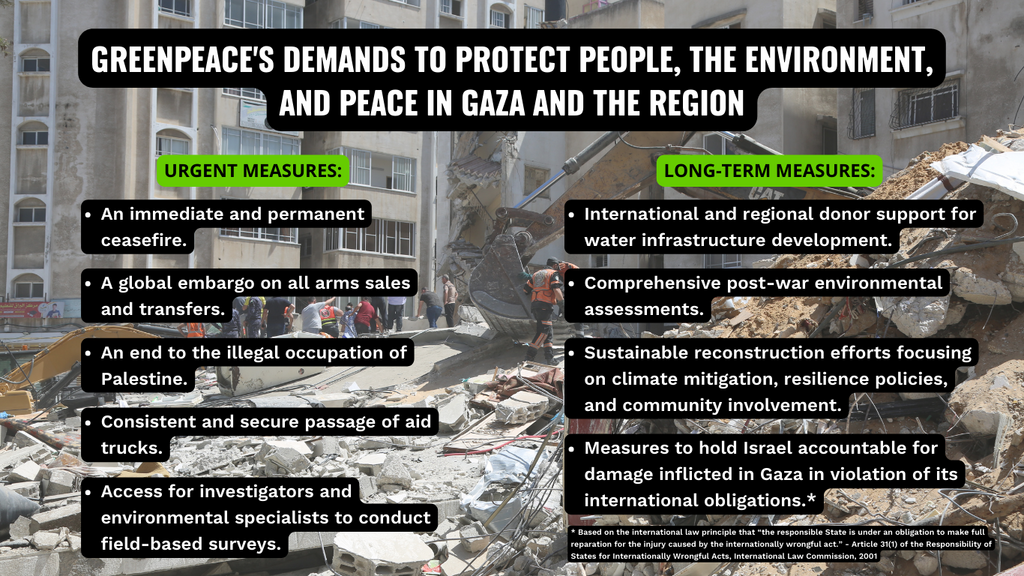
"One of the serious consequences of the war in Gaza has been the massive violation of the right to a clean, healthy, and sustainable environment… which represent a serious risk to life and the enjoyment of all other rights. The region is already experiencing serious climate impacts that could get even worse." - Astrid Puentes Riaño, UN Special Rapporteur on the human right to a healthy environment in The Guardian, 6 June 2024.
Since the beginning of the war, as an environmental and legal researcher, I have been reading and compiling articles and information about the ravaging impact of the war on Gaza's environment. Below is a snapshot of what has been documented so far.
The environmental toll of the ongoing war in Gaza
The ongoing war on Gaza has inflicted severe environmental damage, affecting air, water, and land, and all who depend on them. The immediate carbon emissions from the war are staggering, with a mean estimate of 536,410 tonnes of carbon dioxide in the first 120 days of war, 90% of which are attributed to Israel's air bombardment and ground invasion of Gaza. This is greater than the annual carbon footprint of many climate-vulnerable nations. Heavy metal contamination has been recorded as a result of intensive bombings.
Air is contaminated with chemicals from weapons like white phosphorus due to the heavy use of explosives, and exposure to white phosphorus munitions, in turn, leads to decreased productivity of agricultural land, and can harm existing plants.
Water resources have been severely compromised, with around 60,000 cubic metres of untreated sewage and wastewater flowing daily into the Mediterranean Sea. Gaza's drinking water system, already insufficient before the war, with 90-95% of groundwater undrinkable, is now in a further critical state. On average, in April 2024, Gazans had access to around 2 to 8 litres per person per day, compared to 85 litres per person per day before October 2023. Research indicates that 20 litres per capita per day is the minimum quantity of safe water required to realise minimum essential levels for health and hygiene.
Land and soil degradation have devastated Gaza's agrarian society. The destruction of farms and agricultural lands, coupled with 17 years of blockade, which has deprived the region of essential farming inputs, has led to severe food insecurity. Considering the intensity of the bombardment, it is highly likely agricultural soils in Gaza are contaminated with heavy metals and other chemicals associated with military equipment and munitions. 57% of Gaza's cropland has been damaged as of May 2024. And according to the UN, Israel has reportedly destroyed 70 percent of Gaza's fishing fleet. Livestock are starving, unable to provide food or be a source of food.
#اليوم_العالمي_لسلامة_الأغذية لا يعني فقط الالتفات إلى أزمة المناخ أو الصدمات الاقتصادية وتأثيراتها على عملية إنتاج #الغذاء وسلامته، بل يجب أن يكون كذلك نافذة لتسليط الضوء على تداعيات الحروب على البيئة وسُبل العيش…#WorldFoodSafetyDay pic.twitter.com/JgDXTZVbo5
— Greenpeace غرينبيس (@GreenpeaceAR) June 7, 2024
Olive trees, which are crucial in Palestine due to their deep cultural significance and economic importance, providing livelihoods for many families through olive oil production, have often been deliberately targeted by Israeli soldiers or settlers, becoming a symbol of the suffering of Palestinians dispossessed of their heritage and unable to access their land and crops. The destruction of olive trees is part of a broader pattern of land and property damage – especially witnessed in the West Bank – as well as restrictions that have significant implications for Palestinian livelihoods, food security and the environment.
Public health and the climate crisis: the silent killers
Public health crises and increased vulnerability to the worsening impacts of climate change are silent but deadly consequences of the war. The Middle East and North Africa region is warming nearly twice as fast as the global average. At least 1300 Hajj pilgrims in Mecca have died from heat-related illnesses due to extreme temperatures this year.
Gaza, already a climate-vulnerable region, faces worsening conditions due to the war. Projections indicate that temperatures could rise by 4°C by the century's end, exacerbating erratic rainfall, heatwaves, and droughts. A recent heatwave in April highlighted the dire conditions for the displaced population, with several people dying from the heat.
Public health infrastructure, already weakened by years of blockade, is collapsing under the strain of the war. Sewage, wastewater and solid waste management systems and facilities have collapsed. Thousands of tons of solid waste are accumulating in informal dumpsites across Gaza, and untreated sewage is freely flowing into the sea. The spread of diseases like skin infections, Hepatitis A, and diarrhoea is increasing, with a potential epidemic threatening thousands of lives. Attacks on hospitals and blockades on medical supplies have crippled Gaza's healthcare system, leaving millions in urgent need of humanitarian aid. The presence of decaying bodies further increases the risk of cholera outbreaks. Children whose immune systems and lack of food is making them perilously weak, are particularly at risk.
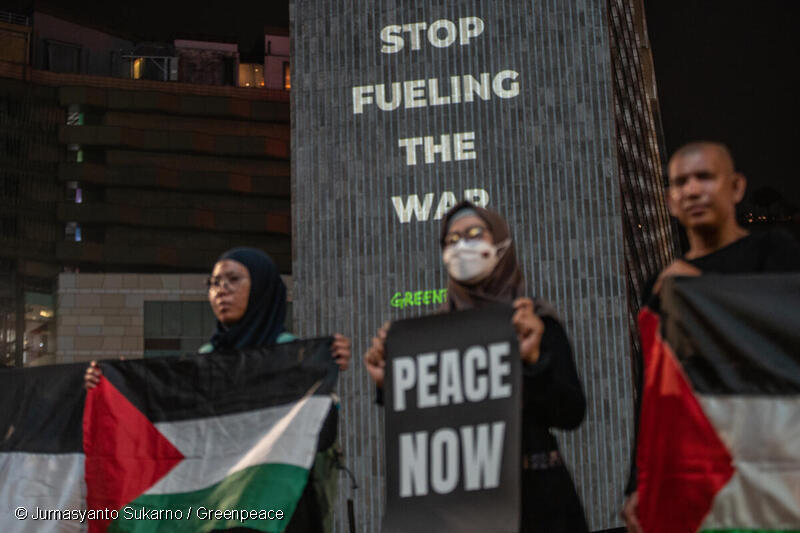
Environmental consequences of the war in Gaza also harm neighbouring countries
The environmental impact of the war extends beyond Gaza, affecting neighbouring countries like Egypt, Jordan, and Lebanon.
Egypt is experiencing pollution in North Sinai and along its Mediterranean coastline, with potential harm to fish stocks, marine life, and groundwater reserves. Air quality has also declined, affecting public health. Jordan too is facing rising air pollution due to its proximity to Gaza.
Lebanon, particularly its southern border areas, suffers from war-related agricultural damage, chemical pollution, and contamination from explosive remnants. There too, a preliminary assessment indicated that white phosphorus shelling has caused extensive environmental harm, impacting natural ecosystems, water quality and posing threats to human health and livestock.
Israel to bear costs of environmental devastation under International Law
Although the natural environment is protected under International Humanitarian Law, it continues to be a "silent casualty of war". The environmental devastation in Gaza violates multiple international laws and conventions designed to protect the environment during armed conflict. The Rome Statute and Geneva Conventions highlight that intentional environmental destruction can constitute a war crime.
Concepts such as "ecocide" have been used by experts and NGOs to describe the ongoing deliberate destruction of Gaza's environment. A recent satellite analysis reveals that "the scale and long-term impact of the destruction have led to calls for it to be investigated as a potential war crime, and to be classed as ecocide, which covers damage done to the environment by deliberate or negligent actions."
International law requires Israel to bear the cost of rebuilding Gaza, given its recognised responsibility as an occupying power.
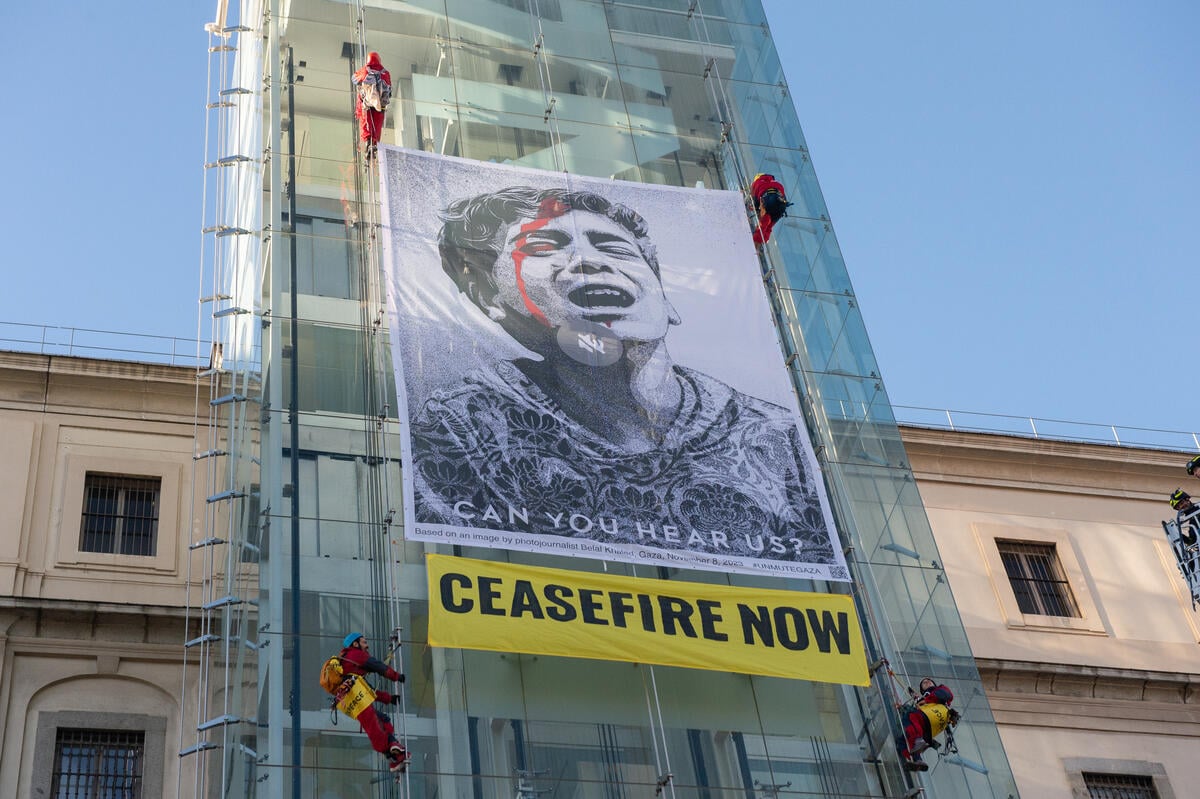
Gaza's "unprecedented destruction will take tens of billions of dollars and decades to reverse"
Recent reports attempted to quantify the damage incurred, the time needed and the cost of repairing and reconstructing Gaza's economy, environment, buildings, primary infrastructure, among others.
An Interim Damage Assessment by the World Bank states that the total cost of damages as of end of January 2024, was approximately US$ 18.5 Billion, the damage already sustained in the water, sanitation and hygiene sector is assessed at over US$ 500 Million; another US$ 629 Million in the agriculture sector, and US$ 411 Million in the environmental sector (including the removal of rubble).
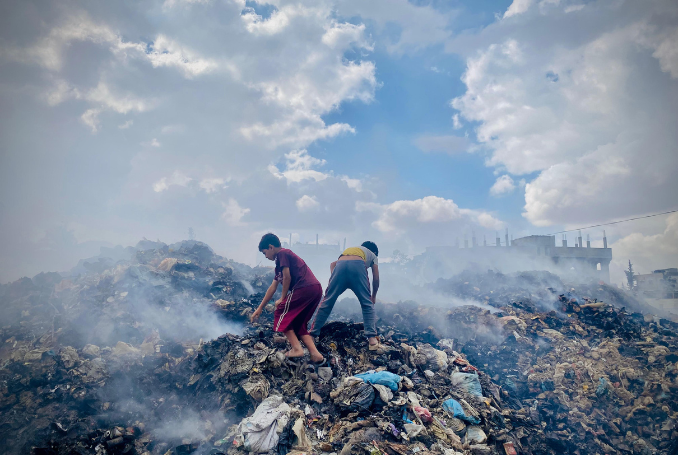
An analysis by researchers in the UK and US said that the carbon cost of rebuilding Gaza will be greater than the annual greenhouse gas emissions generated individually by 135 countries.
According to the UNCTAD, Gaza's "unprecedented destruction will take tens of billions of dollars and decades to reverse". A UNDP report says "the level of destruction in Gaza is such that rebuilding public infrastructure would require external assistance on a scale not seen since 1948", the report also states that Gaza needs approximately 80 years to restore all the fully destroyed housing units, following the same reconstruction patterns as the last two escalations.
With no permanent ceasefire in the horizon, the damage and the cost of reconstruction will inevitably increase, further compromising the ability of the Palestinian people to inhabit Gaza again.
I am witnessing an unfolding genocide with my own eyes, through my phone – a haunting first hand documentation of horror. As long as Israel is not held accountable for the blood it has shed in my region, I fear the Gazans' fate is coming for the rest of us.
Greenpeace's demands to protect people, the environment, and peace in Gaza and the region
Urgent measures:
- An immediate and permanent ceasefire.
- A global embargo on all arms sales and transfers.
- An end to the illegal occupation of Palestine.
- Consistent and secure passage of aid trucks.
- Access for investigators and environmental specialists to conduct field-based surveys.
Long-term measures:
- International and regional donor support for water infrastructure development.
- Comprehensive post-war environmental assessments.
- Sustainable reconstruction efforts focusing on climate mitigation, resilience policies, and community involvement.
- Measures to hold Israel accountable for damage inflicted in Gaza in violation of its international obligations.*
*Based on the international law principle that "the responsible State is under an obligation to make full reparation for the injury caused by the internationally wrongful act." – Article 31(1) of the Responsibility of States for Internationally Wrongful Acts, International Law Commission, 2001.
Addressing the extensive environmental damage in Gaza requires both immediate action and long-term strategic planning to ensure sustainable recovery and future resilience.
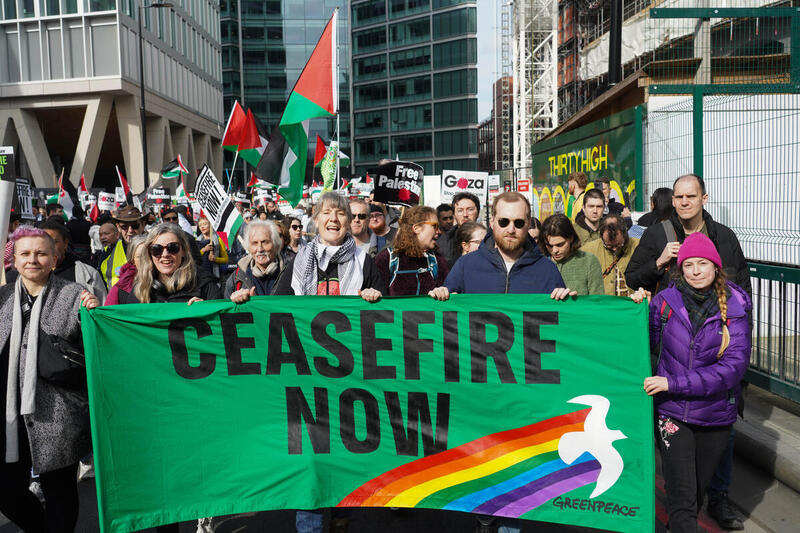
Solidarity actions you can take
Wherever you are, your solidarity can make a difference. Here are some of the things you can do:
Donate to humanitarian organisations in the region such as UNRWA.
Join calls for a ceasefire, an end to the blockade, by joining peace demonstrations where you are.
Support the call for governments to stop selling weapons to all involved. Amnesty International and Greenpeace UK are among many groups calling for an arms embargo in line with national and international law. Some countries are already taking action to block weapons exports. The Netherlands, Spain, Canada, Belgium, and Italy have all moved to suspend arms sales and military support to Israel.
Join Greenpeace Norway and allies to demand that state oil company Equinor ends their destructive business partnerships and fossil fuel investments in occupied Palestinian land, that violate international law.
Farah Al Hattab is a campaigner and legal researcher with Greenpeace Middle East & North Africa based in Beirut. She was born and raised in southern Lebanon.






